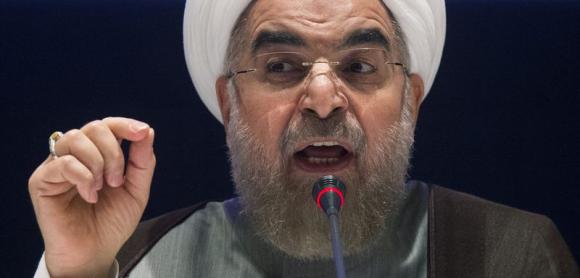
“Did you see the debate and the way of their speaking, accusing and mocking each other? Do we want such a democracy in our country? Do we want such elections in our country?” Rouhani said, speaking to a crowd in the Iranian city of Arak.
“You see the United States that claims it has had democracy for more than 200 years,” he said in comments broadcast live by state TV. “Look at the country, what the situation is where morality has no place.”
Rouhani said that during his September visit to the UN General Assembly, he was asked which of the candidates he preferred. “I said what? Should I prefer bad to worse or worse to bad?”
Iran’s state TV has broadcast two of the debates between Donald Trump and Hillary Clinton in full. It has closely followed the campaign, often highlighting economic and social problems in the U.S. and the most confrontational debate segments.
Rouhani’s speech marked his first public comment on the U.S. election.
Other Iranian officials have weighed in on the debate, using the discord in American politics to highlight alleged nefarious intentions abroad.
The state-run Fars News Agency reports that the senior military aide to Supreme Leader Ali Khamenei believes the Mosul operation in Iraq is being used as a ploy in the election.
Major General Rahim Safavi is reported as saying: “Democrats need the operations underway in Northern Mosul for victory in the upcoming presidential elections.”
According to Fars, Khamenei himself said last week that no matter who is elected, little will change in the way his country views the Americans.
“One of the most important parts of the Islamic Republic’s soft power is its complete distrust of the hegemonic powers, headed by the U.S.”, Khamenei is reported as saying, adding that this mistrust should increase day by day.
Iran will hold its own presidential election in May 2017, and Rouhani is eligible to seek a second term.
Last month, hard-line former President Mahmoud Ahmadinejad said he will not run in the election. Opposition to his candidacy exposed the still-lingering wounds from the widespread unrest that followed his contested 2009 re-election.
Despite a landmark nuclear deal with the United States and world powers that went into effect in January, Tehran and Washington have not restored diplomatic ties that were cut after the 1979 Islamic Revolution and U.S. Embassy takeover.
The deal capped Iran’s disputed nuclear activities in return for lifting international nuclear-related sanctions.
© 2016 CBS

Leave a Reply
You must be logged in to post a comment.